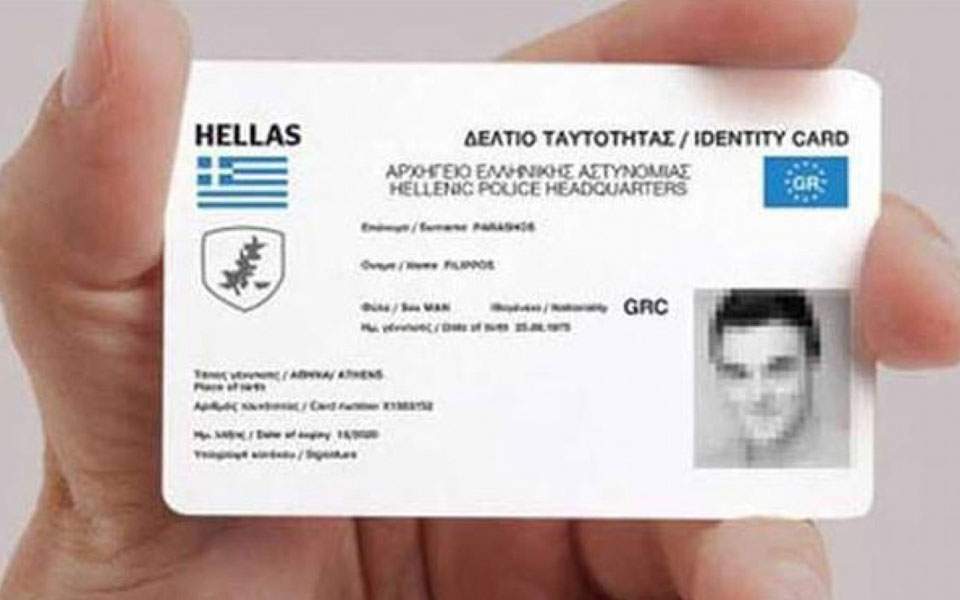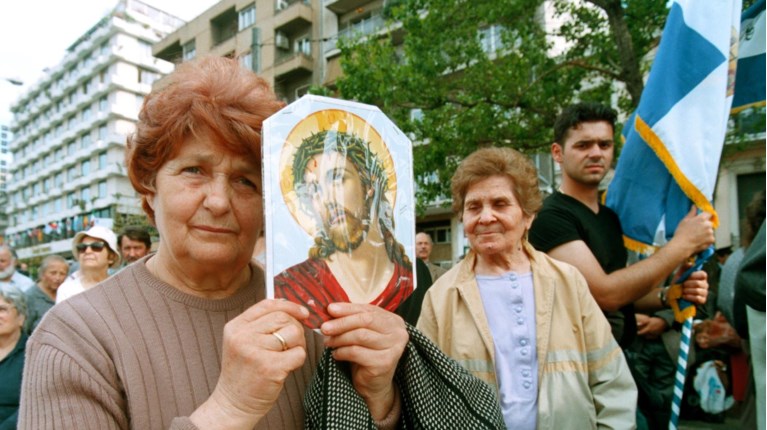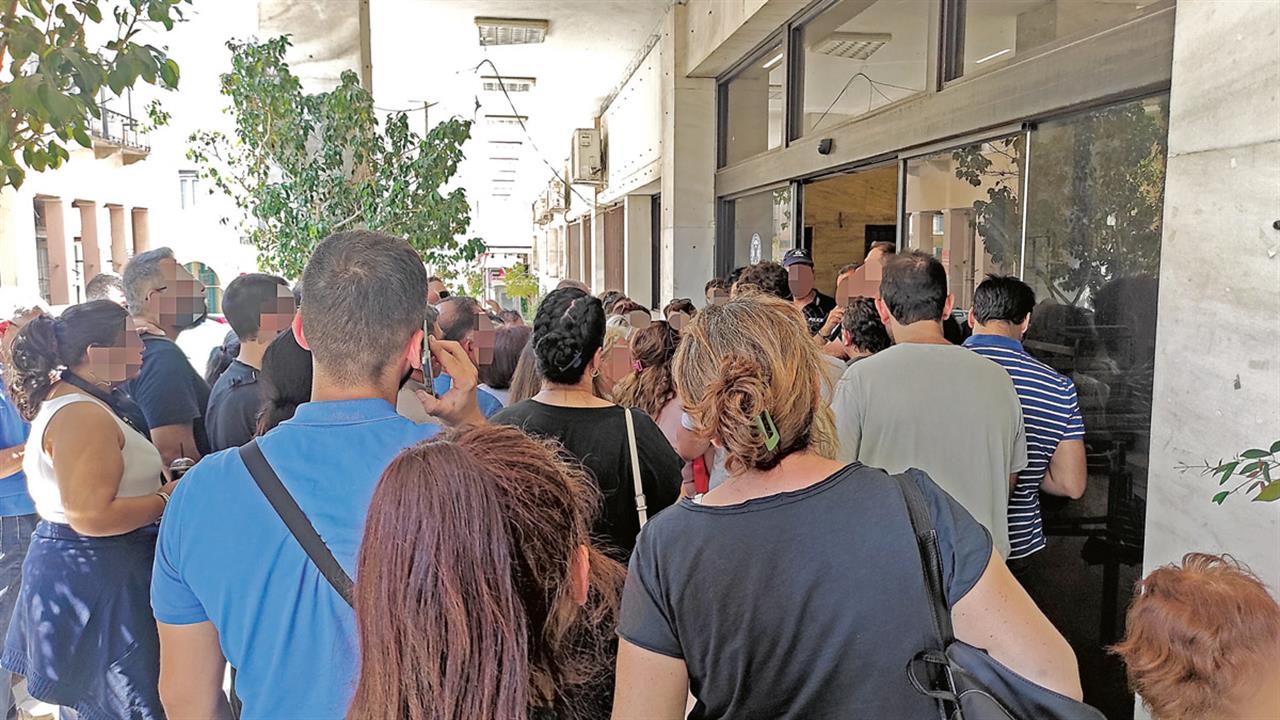By Dimitris Kouvaras,
Why would some people in Greece be flocking to the police stations and enduring all-night waits, as if there was a new iPhone release or a Black Friday? In what context does an anticipation of the devil’s surge meet the technology of biometrical data? How can the weird behavioral pattern from above be interpreted in a framework that embraces other oddities -from the perspective of rational decision-making- such as Brexit and the refusal of COVID-19 vaccination?
What these instances of decision-making, synchronised social reaction, or public protest have in common is a propensity of certain people to endorse irrational beliefs, which leads them to accordingly irrational actions. In the Greek case, certain radical religious groups opposing the new ID cards that the government intends to publicly present in this year’s International Exhibition of Thessaloniki, have spread conspiracy theories in social media, which present the new cards as instruments of the Devil and means of a malevolent surveillance that people will be deviously subjected to. Consequently, religious people, ranging from zealots to right-wing extremists and mere elderly persons, started rushing to the police stations to renew their ID cards in the current configuration and avoid the upcoming apocalypse.

When interviewed, they all refer to a micro-chip supposedly contained in the plastic ID cards and procuring the surveillance; to the recording of biometrical data; to the antichrist; to the loss of DNA; to the inclusion of the number 666 in the cards; above all to the fact they “disagree” with the new IDs and want things to remain as previous. Public marches have been organized in many cities, imbrued with national(ist) and Christian symbols such as flags, crosses, and religious icons. For these people, the Nation (with capital N) is in danger because of a plastic card. What can be said of them?
On the one hand, they have made themselves a public sensation -or ridicule, depending on how one sees it- by appearing on the news and in humorous YouTube videos. On the other hand, I believe this phenomenon is susceptible to sociological analysis, in correlation with similar occurrences such as those described in the beginning. These spurs of irrationality that have become increasingly frequent recently, can be interpreted as expressions of a “post-truth” attitude by certain groups of people. “Post-truth” is a term that, on a primary level, denotes the diminution of the importance of truth over that of emotion in the processes of belief formation and decision-making. It is regarded as an attribute of certain social settings in contemporary times, correlative to the expansion of social media the diffusion of access to information, and the capability of public opinion sharing. It is through the media that these zealots state they “disagree”.

To explain the conspiracy theories behind the new ID cards in a post-truth context, one must first bear in mind some important formative parameters of this dissent. Secularisation in Greece has been a long and arduous process in its history as a modern state, since religion has been one of the drivers for the creation of national identity, both in the 19th and early 20th centuries. Religious sentiment remains high among older people, who have not hesitated to openly resist reforms, such as the removal of the religion’s inscription on ID cards at the dawn of the century. Then came the infamous economic crisis that rocked Greek society from 2009 onwards, leaving large segments of the population with a strong sense of abandonment from the state, and still shedding its shadow heavily upon public opinion by evoking dissatisfaction. As the 2010s progressed, along with the progressiveness recorded in social beliefs came waves of regressive thought and political practice, that were able to rally the dissatisfied, the religious radicals, and the advocates of the far right. The same applies to 2023.
The above provides a sociohistorical context but is not enough. It would, at best, be adequate to explain the presence of scattered fanatic and dissatisfied individuals, who view the new IDs with skepticism and eschew common sense. However, it is no match for an interpretation of the momentum this movement has acquired. For that, we need to delve into the realm of “post-truth” and its insights for the conceptualization of the relation between fact and emotion and the role of social media.
What is accepted as a fact by someone, sociologically speaking, is not necessarily what is true or is a fact. It often is what is congruent with their current established set of beliefs and emotional dispositions. During this process, factual epistemic validation can be overridden by a need for “utility” of what is taken to be a fact, in the sense that it must harmonize with the subject’s current reality picture and emotional state. In that sense, people are often willing to sustain irrational beliefs just because they are confirming their preconceptions and enable them to sustain their distorted view of reality, which they are not able or ready to shed off.

Social media compounds this effect by creating “filter bubbles”, environments where people can access only information aligned with their pre-existing beliefs. They also enable the dissipation of false information, such as conspiracy theories, that can nonetheless claim legitimacy in the eyes of the appropriate audiences. What comes as a result is a sort of networking between people with similar irrational beliefs; the creation of online “communities” and groups that serve as hubs for their enhancement and propagation. Scattered zealots can thus, from the comfort of their sofas, engage with content confirming their fantasies, and relate to other such people, which could result in an organized movement.
So did in the Greek case, but thankfully on a very small scale. The irony is that extreme traditionalists have ended up “going meta”, an expression used by Fuller to describe the main characteristics of “post-truth”. Although their views are regressive, they express them through a distinctly modern digital configuration of communication and fact-sharing, in which emotional gratification and confirmation bias take precedence over facts. This apparent contradiction can be attested to by the fact that smartphones are widely present in their gatherings, as are the crosses, flags, and icons. One can hear cries against “digital enslavement” at the same gatherings.
As already mentioned, this movement remains marginal and poses no threat. However, it is worth stating the role such configurations have played in other way more influential and important issues, such as Brexit, the Capitol breach of 2021, or the anti-vaccination movement. The post-truth environment opens new possibilities for channeling public anger, leading to irrational paths. This is a propensity that should be taken into consideration by governments and media agents alike, to avoid similar escalations. In any case, the bottom line remains the same: the less fragmented and the more integrated a society is, the less likely it will be for such phenomena to gain momentum.
References
Fuller, S. (2018) Post Truth: Knowledge as a Power Game. London: Anthem Press.
Malcolm, D. (2021). Post-Truth Society? An Eliasian Sociological Analysis of Knowledge in the 21st Century. Sociology, 55(6), 1063–1079. Available here
Papadopoulos, N. (August 22, 2023). Conspiracies and ‘rigged’ ID cards. Kathimerini. Available here




